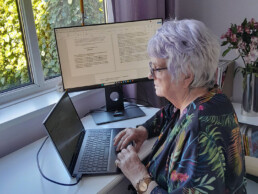Stamina with Style
Building stamina with style is very achievable – it is about expectation. And expectations shape outcomes – so Robert Rosenthal said in November 2003. It is known as The Pygmalion Effect! If you expect children from aged 7 upwards to complete a side or more of lively, relevant and technically accurate writing within 50 minutes, the majority will be successful by the 4th session of weekly unsupported writing. Stamina will now be maintained for as long as the weekly sessions and the expectation are sustained and teaching for writing can focus much more on building of extensive and rich vocabulary and sentence structures.
And don’t let anyone hear you say, “We haven’t got the time!”
We are developing a new programme that teaches children to a) talk correctly in Standard English b) use sophisticated language structures and vocabulary with confidence and c) re-develop writing stamina.
The teaching of accuracy and style should be taught in schools as most children will not develop these skills spontaneously through reading. In Talk:Write it is achieved in bite-sized, fun activities and games enjoyed in short sessions (often of around 10 minutes) scattered across every week in between lessons or as a ‘brain-break’ in the middle of a lesson. They are made relevant to the teaching that is taking place and thus may be adapted to any subject of the curriculum. The sustained, unsupported writing is deliberately moved around the subjects that lend themselves to extended writing, so that it does not dominate the English curriculum; for example – this week it might be reporting a science investigation, next week it might be a discursive text on decimation of the rainforests and the week after it may be a persuasive piece for PSHE on the importance of a daily PE session for every child.
What fun the children have had in our trials! They love the short role plays with characters of different speech registers and attitudes. Our programme values and cherishes regional accents and dialects which we believe should be used in parallel with learning Standard English and sophisticated structures. Pupils also compete eagerly to solve a challenge or register the most examples against the clock and they laugh with glee as they spot specific features or errors. Classes cheer when they know it is time for Talk:Write – and week by week their writing becomes increasingly mature and sophisticated. And when it comes time to produce their extended writing – they are eager to showcase their newfound writer’s voice and style.
Dedicating one hour a week to such an important skill as written communication that is the vehicle for testing of subject knowledge across the whole curriculum for their entire secondary (and for some – higher) education should be an easy decision to make. If you study marked GCSE and ‘A’ Level scripts in subjects like science, geography and history – the differences between the highest and the lowest scoring scripts is very often NOT subject knowledge per se, but rather the ability to communicate that knowledge in grammatically correct and often expressive writing, while working at sufficient pace to be able to complete the paper within the time scale. It takes true stamina to write at length while responding to stimuli or questions that were previously unseen. Thinking about answers takes time. Composing the language of answers will take time if it has to be done consciously. The process of producing 2 or more sides of writing can be tiring if not pre-programmed. All these factors can spell doom for a pupil who has not previously been required to complete such work in one sitting.
Rest assured, the choice is yours! The current government and testing agencies don’t seem bothered but for us and for the children we teach – STAMINA WITH STYLE MATTERS!
Find out more about the Stamina with Style Online CPD course. We have a School or Single Licence option.
Get in touch to find out more about Talk:Write and building stamina with style.
Talk:Write
A fun and flexible approach to improving children’s vocabulary, speech, and writing.


